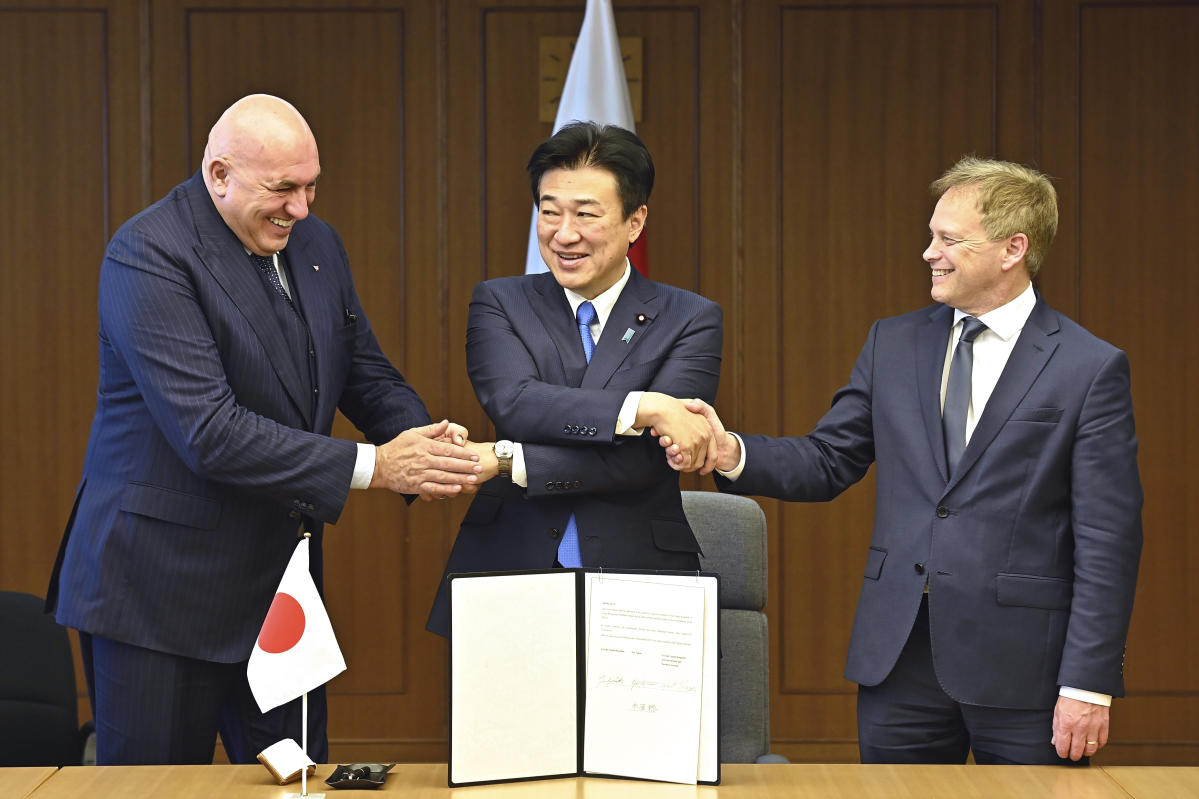TOKYO (AP) — Japan's cabinet on Tuesday approved a plan to sell next-generation fighter jets it is developing with Britain and Italy to other countries, the latest move away from the country's postwar pacifist principles.
Controversial decision Allowing international arms sales is expected to help secure Japan's role in the joint fighter aircraft project and is part of a move to build up Japan's arms industry and enhance its role in global security.
The Cabinet also agreed to review Japan's weapons equipment and technology transfer guidelines to allow the sale of jointly produced lethal weapons to countries other than partners.
Japan has long restricted arms exports under the country's pacifist constitution, but has quickly taken steps to liberalize restrictions amid rising regional and global tensions, especially from neighboring China.
The decision on the aircraft will allow Japan to export the lethal weapons it is involved in producing to other countries for the first time.
Japan is working with Italy and the United Kingdom to develop an advanced fighter jet to replace its aging fleet of American-designed F-2 fighters and Eurofighter Typhoon fighters used by the British and Italian militaries.
Japan, which previously worked on a homegrown design called FX, agreed in December 2022 to combine its efforts with a British-Italian program called Storm. For publication in 2035. Joint venture known as Global Combat Air Program Or GCAP, based in the United Kingdom
Japan hopes that the new aircraft will provide advanced capabilities that Japan needs amid growing tensions in the region, giving it a technological advantage against its regional rivals China and Russia.
Because of its wartime past as an aggressor and the devastation that followed its defeat in World War II, Japan adopted a constitution that limited its military powers to self-defense. The country has long maintained a strict policy of limiting transfers of military equipment and technology and banning all exports of lethal weapons.
Opponents criticized Prime Minister Fumio Kishida's government for committing to the fighter jet project without providing an explanation to the public or getting approval for the major policy change.
To address these concerns, the government is limiting exports of lethal co-developed weapons to aircraft for the time being, and has promised not to make any sales for use in active warfare.
The government also confirmed that the revised guideline currently only applies to aircraft and that it will require Cabinet approval to do so. Potential buyers will also be limited to the 15 countries with which Japan has signed defense partnership and equipment transfer agreements.
Recent polls indicate that public opinion is divided on the plan.
In 2014, Japan began exporting some non-lethal military supplies, and in a more recent move Last December, it was approved It is a change that would allow the sale of 80 lethal weapons and their components manufactured under licenses from other countries to licensees. This change paved the way for Japan to sell American-designed Patriot missiles to the United States, which would help replace the munitions that Washington sends to Ukraine.
The Cabinet said in its decision that the arms export ban on finished products would hinder efforts to develop the new aircraft, and Japan was limited to a supporting role in the project. Italy and the United Kingdom are keen to sell the plane in order to defray the development and manufacturing costs.
Kishida sought cabinet approval before signing the GCAP deal in February, but was delayed by resistance from his junior coalition partner, the Buddhist-backed Komeito party.
The change also comes as Kishida plans a state visit to Washington in April, where he is expected to underscore Japan's willingness to play a greater role in military and defense industry partnerships.
Exports would also help boost Japan's defense industry, which has historically only been concerned with the country's Self-Defense Forces, as Kishida seeks to build up the military. Despite the industry's efforts over the past decade, it still struggles to attract customers.
___
Find more AP coverage of Asia and the Pacific at https://apnews.com/hub/asia-pacific

“Unapologetic tv specialist. Hardcore zombie trailblazer. Infuriatingly humble problem solver.”







More Stories
Stand News editors convicted in sedition case
Latest Baysail sinking: Mike Lynch’s wife ‘didn’t want to leave boat without family’ as crew investigated
WFP halts Gaza operations after repeated shooting at aid vehicle